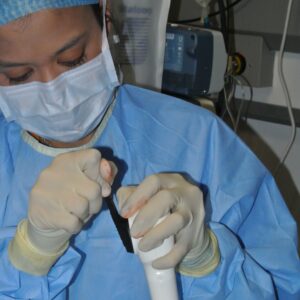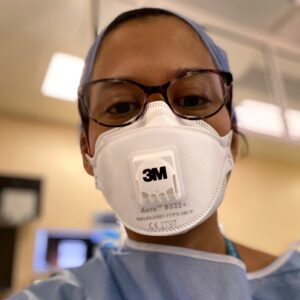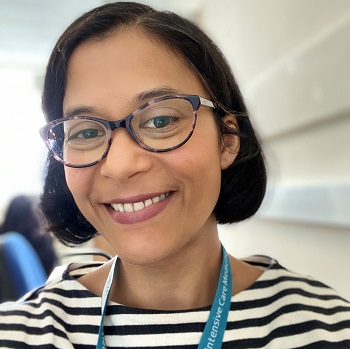
Dr Rosie Baruah is from the MBChB class of 2000. She is a Consultant in Intensive Care Medicine at the Western General Hospital in Edinburgh.
What have you been up to since graduation?
I spent a year doing house jobs (as the first post qualification year used to be called) at the old Edinburgh Royal infirmary. I then did a two-year general medicine rotation followed by two years as an anaesthetist at SHO level. I then worked less than full-time as a registrar in anaesthetics and intensive care medicine. I did all of this training in South East Scotland. I liked it so much I never found a good reason to leave! During my training years I completed my MRCP, FRCA and the European Diploma in Intensive Care Medicine. I was appointed to my consultant post in intensive care medicine and Anaesthesia at the Western General Hospital in November 2012.
Why did you choose this career path?
During the final module of my intercalated degree in neuroscience we visited the intensive care unit at the Western General–at the time it was in the regional neurosciences ICU. I remember looking at all these really sick patients covered in lines and tubes, connected to all these machines, and thinking that this just looked like the most amazing place to work, looking after these incredibly sick people. As I continued in my postgraduate training I realised I wanted to be a generalist, that I really enjoyed working with a very sick patients and I that I like practical procedures. Intensive care medicine involves all of these things.
 What are your inspirations for the future?
What are your inspirations for the future?
Right now, we are still in the thick of the second wave of the coronavirus pandemic. My inspirations for the future are pretty much limited to getting through to the other side of it!
What have your experiences been like as a female BAME doctor?
I grew up in North East Glasgow and went to a comprehensive school that did not send many people to university. Coming to Edinburgh as an undergraduate medical student was a real culture shock. I think I spent a lot of my undergraduate and postgraduate training catching up with the fact that I am not nearly as thick as I sometimes think I am.
I think a lot of people, particularly women, suffer from this kind of impostor syndrome. In the medical school and in the major teaching hospitals there are very few senior doctors who look like me. Having this lack of role models can make it really challenging to see yourself in a senior position. I am fortunate in that I have never been at the receiving end of racism or race-based discrimination, as far as I’m aware–but I’m also aware I was brought up in Scotland and my experience may be very different to somebody who perhaps has come here as an overseas medical graduate.
I have been on the receiving end of benevolent sexism. There were several senior doctors who, when I told them I wanted to do intensive care medicine, very kindly told me that this would be a very challenging career path to balance with being a mother, and I may want to rethink my career plans. This advice was given with my well-being at heart, I don’t doubt that, but nevertheless it was not helpful and what’s more it really wasn’t true. I also don’t know of any male colleagues who were given the advice that intensive care medicine would be difficult to combine with fatherhood.
 On your Twitter page, you are an advocate for many issues present in the NHS. Can you tell us more about them?
On your Twitter page, you are an advocate for many issues present in the NHS. Can you tell us more about them?
I am very interested in the concept of gender bias in medicine, and how it can really quite profoundly affect the experiences of men and women within our profession. Gender stereotypes allow us only to behave in very prescriptive ways that align with our stereotypes. If we behave in ways that contradict our stereotypes, we can face backlash. So, for example, a loud and bossy woman or a ‘quiet and wimpy’ man will not be seen as effective doctors. This has nothing to do with their proficiency and everything to do with how we expect them to behave based on their gender stereotypes.
I am also a strong advocate for increasing the proportion of women choosing to train in intensive care medicine. It is currently a very male dominated profession at consultant level. For the last 25 years more than half of all medical graduates have been women, and yet only 20% of intensive care consultants are women. There is a perception that this is not a female friendly specialty but this is completely untrue. I am now undertaking an MD to examine the factors that underlie the gender balance in intensive care medicine.
I am currently part of the BMA campaign to encourage health boards to provide period products in all toilet areas in NHS health board buildings. When you are a trainee doctor working shifts, the last thing you need to worry about is access to period products.
What is something we, as medical students, can do to alleviate these problems?
I think the upcoming generation of doctors, in keeping with your generation in more general terms, do not believe in strict gender stereotypes and in fact do not believe that gender is a binary. I think your generation is going to be the generation of doctors that rewrites the old tired professionalism standards that in reality were never about enhancing performance but were all about encouraging conformity. I also think that your generation is not afraid to speak truth to power and I think this is a glorious thing.
What do you enjoy doing in your free time?
In all truth a lot of my free time is spent doing laundry! But I enjoy Ashtanga yoga, I enjoy reading and baking. Unlike many intensivists and anaesthetists, I am no triathlete!
Do you have any advice for medical students and aspiring doctors?
Honestly, the pressures that medical students and aspiring doctors have nowadays in terms of building their CVs is far, far greater than it was for doctors of my generation, regardless of what we may tell you. Whenever I am sent a CV of a senior medical student or even of a school student planning to apply for medicine, I am blown away with how accomplished they are.
My general advice would be to read over whatever it is you’ve seen or been taught about that day. I didn’t do this nearly as much as I should have as a medical student, but I think it is a really good way of reinforcing any learning that you’ve had during the day.
If you have an attachment that you particularly love and you think it’s something you may want to specialise in long-term, don’t be afraid to email any of the doctors who were involved in teaching you. There is nothing better than hearing that somebody has been inspired into going into the specialty that you yourself have chosen.
What is your philosophy of life?
After my daughter was born, my mother told me I needed to think about what being good enough was to *me*–and aim for that, rather than stress out trying to be perfect. That’s been my philosophy for the last 14 years. It’s not about being the best it’s about being a good enough mother and doctor. And that’s good enough for me!
Follow Dr Rosie Baruah on Twitter



